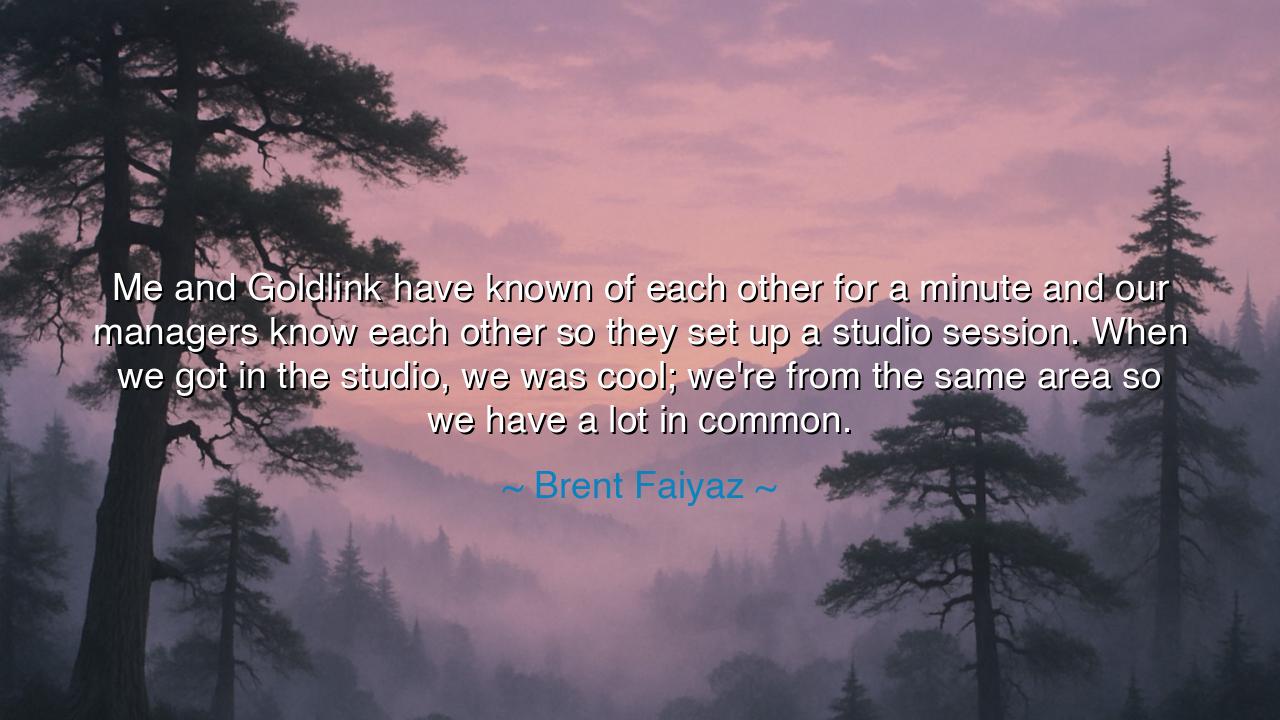
Me and Goldlink have known of each other for a minute and our
Me and Goldlink have known of each other for a minute and our managers know each other so they set up a studio session. When we got in the studio, we was cool; we're from the same area so we have a lot in common.






"Me and Goldlink have known of each other for a minute and our managers know each other so they set up a studio session. When we got in the studio, we was cool; we're from the same area so we have a lot in common." – Brent Faiyaz.
In this reflection, Brent Faiyaz speaks to the deep, often unspoken connections that bind people together, even before they meet face-to-face. His words highlight the power of shared experiences, the invisible threads that link individuals from the same place, and how those connections can foster understanding and creativity. The studio session, which could have been a tense or awkward collaboration, became a natural and fluid experience because both he and Goldlink hailed from the same area, sharing a common background and culture. This simple but profound encounter speaks to the importance of community and shared roots in building meaningful relationships, both personally and professionally.
The ancient Greeks understood the value of shared identity in fostering unity. The idea of philia, or deep friendship, was central to their understanding of how individuals connect and build bonds within a community. Aristotle often discussed the importance of friendships based on mutual understanding and shared values. For him, the strongest form of friendship was one that stemmed from common purpose, mutual respect, and shared virtues. In Faiyaz’s words, we see a modern embodiment of this ancient principle—two individuals who, by virtue of their shared background, find it easier to connect and collaborate, paving the way for a partnership rooted in understanding and respect.
Consider the famous alliance between Alexander the Great and Hephaestion, his childhood friend and companion. Their relationship was not merely one of convenience or status, but was rooted in a shared upbringing, common experiences, and mutual trust. This bond allowed them to work seamlessly together as military leaders, facing challenges with the strength of their combined vision. Alexander and Hephaestion’s collaboration, much like Faiyaz and Goldlink’s, was built on a foundation of shared experience—a familiarity with each other’s ways of thinking, backgrounds, and cultural values, which made their partnership not just effective but deeply meaningful.
Similarly, the Renaissance artists, such as Leonardo da Vinci and Michelangelo, though often rivals, shared a common artistic vision and understanding of their craft. Their connections were often fostered through the same guilds, shared spaces of learning, and common goals. Even when they worked separately, their understanding of one another’s work was shaped by their shared training and cultural context. This unity of purpose allowed for a profound sense of creative collaboration, even in competition. Like Faiyaz and Goldlink, the Renaissance artists knew that while they were individual talents, their roots and shared experiences elevated their work and influenced the larger culture around them.
Faiyaz’s story, then, teaches us a powerful lesson about the importance of shared experiences in fostering meaningful relationships. When people come from similar backgrounds, it’s easier for them to understand each other’s motivations, struggles, and triumphs. This shared history allows them to collaborate without the barriers that might arise between strangers. Whether in the arts, business, or any other field, relationships based on mutual understanding are often the strongest and most effective. It is not the external accolades or the success alone that bind people together, but their shared roots, values, and experiences.
In our own lives, we can take Faiyaz’s insight to heart by recognizing the power of community in our personal and professional interactions. While diversity is important, there is also value in seeking out relationships with those who share a common ground with us. This doesn’t mean excluding others, but rather understanding that collaboration is often more fruitful when people understand each other’s context. Like Faiyaz and Goldlink, we can build relationships based on shared experiences, mutual respect, and authenticity, allowing us to collaborate more effectively and create meaningful outcomes.
The lesson here is clear: connection is often rooted in shared experiences, and it is these connections that form the foundation of successful collaboration. In our pursuit of personal and professional growth, we must not overlook the importance of community and commonality. By fostering relationships with those who understand our journey and who come from similar walks of life, we open the door to collaboration and creativity that transcends the boundaries of mere coincidence. Embrace the power of shared experiences, knowing that through these connections, we can build something far greater than ourselves.






AAdministratorAdministrator
Welcome, honored guests. Please leave a comment, we will respond soon